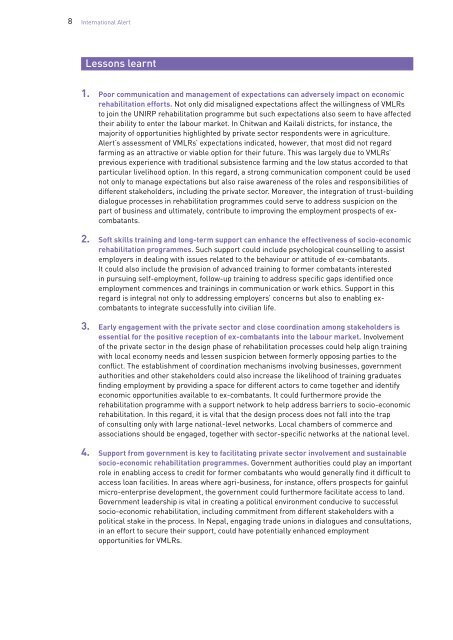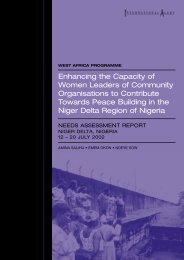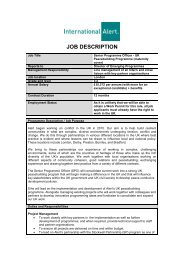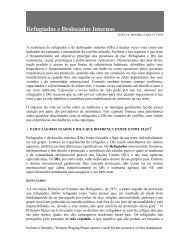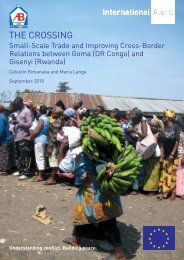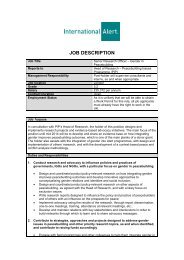strengthening the economic dimensions of ... - International Alert
strengthening the economic dimensions of ... - International Alert
strengthening the economic dimensions of ... - International Alert
Create successful ePaper yourself
Turn your PDF publications into a flip-book with our unique Google optimized e-Paper software.
8 <strong>International</strong> <strong>Alert</strong><br />
Lessons learnt<br />
1. Poor communication and management <strong>of</strong> expectations can adversely impact on <strong>economic</strong><br />
rehabilitation efforts. Not only did misaligned expectations affect <strong>the</strong> willingness <strong>of</strong> VMLRs<br />
to join <strong>the</strong> UNIRP rehabilitation programme but such expectations also seem to have affected<br />
<strong>the</strong>ir ability to enter <strong>the</strong> labour market. In Chitwan and Kailali districts, for instance, <strong>the</strong><br />
majority <strong>of</strong> opportunities highlighted by private sector respondents were in agriculture.<br />
<strong>Alert</strong>’s assessment <strong>of</strong> VMLRs’ expectations indicated, however, that most did not regard<br />
farming as an attractive or viable option for <strong>the</strong>ir future. This was largely due to VMLRs’<br />
previous experience with traditional subsistence farming and <strong>the</strong> low status accorded to that<br />
particular livelihood option. In this regard, a strong communication component could be used<br />
not only to manage expectations but also raise awareness <strong>of</strong> <strong>the</strong> roles and responsibilities <strong>of</strong><br />
different stakeholders, including <strong>the</strong> private sector. Moreover, <strong>the</strong> integration <strong>of</strong> trust-building<br />
dialogue processes in rehabilitation programmes could serve to address suspicion on <strong>the</strong><br />
part <strong>of</strong> business and ultimately, contribute to improving <strong>the</strong> employment prospects <strong>of</strong> excombatants.<br />
2. S<strong>of</strong>t skills training and long-term support can enhance <strong>the</strong> effectiveness <strong>of</strong> socio-<strong>economic</strong><br />
rehabilitation programmes. Such support could include psychological counselling to assist<br />
employers in dealing with issues related to <strong>the</strong> behaviour or attitude <strong>of</strong> ex-combatants.<br />
It could also include <strong>the</strong> provision <strong>of</strong> advanced training to former combatants interested<br />
in pursuing self-employment, follow-up training to address specific gaps identified once<br />
employment commences and trainings in communication or work ethics. Support in this<br />
regard is integral not only to addressing employers’ concerns but also to enabling excombatants<br />
to integrate successfully into civilian life.<br />
3. Early engagement with <strong>the</strong> private sector and close coordination among stakeholders is<br />
essential for <strong>the</strong> positive reception <strong>of</strong> ex-combatants into <strong>the</strong> labour market. Involvement<br />
<strong>of</strong> <strong>the</strong> private sector in <strong>the</strong> design phase <strong>of</strong> rehabilitation processes could help align training<br />
with local economy needs and lessen suspicion between formerly opposing parties to <strong>the</strong><br />
conflict. The establishment <strong>of</strong> coordination mechanisms involving businesses, government<br />
authorities and o<strong>the</strong>r stakeholders could also increase <strong>the</strong> likelihood <strong>of</strong> training graduates<br />
finding employment by providing a space for different actors to come toge<strong>the</strong>r and identify<br />
<strong>economic</strong> opportunities available to ex-combatants. It could fur<strong>the</strong>rmore provide <strong>the</strong><br />
rehabilitation programme with a support network to help address barriers to socio-<strong>economic</strong><br />
rehabilitation. In this regard, it is vital that <strong>the</strong> design process does not fall into <strong>the</strong> trap<br />
<strong>of</strong> consulting only with large national-level networks. Local chambers <strong>of</strong> commerce and<br />
associations should be engaged, toge<strong>the</strong>r with sector-specific networks at <strong>the</strong> national level.<br />
4. Support from government is key to facilitating private sector involvement and sustainable<br />
socio-<strong>economic</strong> rehabilitation programmes. Government authorities could play an important<br />
role in enabling access to credit for former combatants who would generally find it difficult to<br />
access loan facilities. In areas where agri-business, for instance, <strong>of</strong>fers prospects for gainful<br />
micro-enterprise development, <strong>the</strong> government could fur<strong>the</strong>rmore facilitate access to land.<br />
Government leadership is vital in creating a political environment conducive to successful<br />
socio-<strong>economic</strong> rehabilitation, including commitment from different stakeholders with a<br />
political stake in <strong>the</strong> process. In Nepal, engaging trade unions in dialogues and consultations,<br />
in an effort to secure <strong>the</strong>ir support, could have potentially enhanced employment<br />
opportunities for VMLRs.


